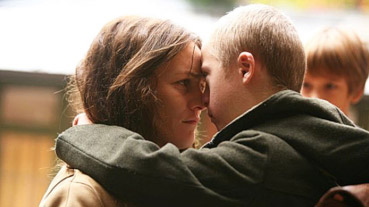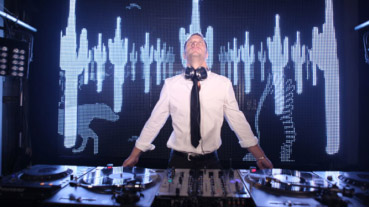|
Jean-Marc Vallée's Café de Flore is an admirably conceptual, sometimes pretentious work that's densely atmospheric and narratively a little too ambitious. A capricious relay race between past and present, and a head-scratcher for the majority of its running time, the film's enigmatic metaphysical intentions aren't made clear until well into the third act when one character seeks the advice of a medium, conveniently placed to explain the prolonged question mark hovering over two seemingly unconnected stories of obsessional fixation.
An early overhead shot allows a quick glimpse at the books piled up on the same character's nightstand, 'The Meaning of Dreams' and beneath that, 'Our Past Lives'. Hints of mystic projection and reincarnation are ambiguously strung out right up until a post-credits coda, which remains open for interpretation. Between these two points, nervily elliptical editing drops a series of visual breadcrumbs; duplicate shots and match-cut edits, spookily teasing a connection from an otherwise finicky convergence of parallel lives.
In present-day Montreal, Carole (Helene Florent) is still consumed with thoughts of Antoine (Kevin Parent) her high school goth sweetheart and divorced farther of her children. Antoine has since moved on from Robert Smith to dance floor beats, now a superstar DJ with a sexually, free-spirited girlfriend (Evelyne Brochu) and seemingly unaware of how his touring lifestyle is affecting his two daughters, dogged as he is by memories of the wife and soul mate he can't get out of his head.

In 1960s Paris, impoverished single mother Jacqueline (Vanessa Paradis) struggles to raise her beloved son Laurent (Martin Gerrier), born with downs syndrome. This was a time when children with downs were not expected to live past twenty-five, though Jacqueline is convinced her unconditional love will disprove statistics and that her little boy will live long enough to be an old man.
The unflagging, tooth-and-nail aspiration of a mother's tough love is such that Jacqueline tends to push Laurent at an age where the child's disability can sometimes make it impossible for him to understand why. She loves him dearly and devotedly in a bed-sharing fashion that tips perilously close to smothering (not dissimilar from Babycall earlier this year), but in spite of her tightly wound parenting, Paradis makes it clear that her character's intentions come from a very pure place; a mother doing the very best she can and always putting Laurent's interest before her own, even when she's naively unaware or forcibly in denial of what those best interests might be.
For all her frustrations, Laurent is the light of his mother's life, imbuing her with child-like wonder and happiness which deserted her the day her husband balked at the prospect of raising a boy with downs and walked out. Best friends as much as they are mother and child, Jacqueline obviously needs Laurent as much as he needs her. The boy is quick witted, sharp-humoured and self-possessed in a way that lightens the desultoriness of single parenthood, characteristics which seem to inform the performer as much as the character. The chemistry between Paradis and Gerrier is sure to break a lot of hearts and being as charismatic and charming as he is, it's not hard at all to understand Jacqueline's envy once Laurent falls hard for a girl in his class who also has downs and only wants to be with her. Mum is now very much her soul mate's second favourite and with subtle inevitability, Jacqueline's story becomes Laurent's, learning as she does that in order for her son to grow up in the way she envisioned, she must loosen her grip and allow him to get there on his own two feet.
By far the most wrenching and involving of the two plotlines, the frequency of the insistently stylish yanks back to the present soon start to annoy. Whereas Paradis and Gerrier present us with a lived-in relationship and fully rounded characters whose story feels purposeful and sure-footed, the same can't be said of rejected Carole stuck in a teenage slump and her self-involved ex Antoine, whose relative wealth and security make him hard to care about. Paradis and Gerrier have chemistry Florent and Parent simply don't (though it's very much there in his scenes with Brochu). The suggestion that Antoine might in actual fact be the reincarnation of Laurent engenders only anger, given that one is so charming and the other charm-free. Carole and Antonine once shared an adolescent penchant for eyeliner and later even had kids, but they rarely convince as soul mates.

Like Jacqueline before her, Carole must let go of her husband, but his needing her permission to move on after she's finally come to terms is a resolution with none of the intended romanticism, coming off as puerile and weak-willed. Unable to face up to past mistakes, Antoine expresses his misplaced existential angst in big-beat floor-fillers. "I like to cut the sound – it gives more punch to what's happening", he says of his DJ sets. Director Vallée would seem to agree. As shorthand expression for a close-mouthed character barely sketched, the malestrom behind the eyes is drowned in sound, effectively weaving time and space together in a somnambulistic palimpsest. Turbulent sonority steadily builds in tandem with increasingly urgent kaleidoscoping of time frames, eras smashing together like bodies, repeatedly shown hugging and desperately clinging to what will eventually be lost. At the peak of this elated rush – the moment of tightest embrace – the sound cuts out, unadorned close-ups capturing soul drift in deafening silence.
As if they stumbled across this confluence of form and expression in the edit, Vallée and his sound team admittedly lean too heavily on montage when they should be telling a story but in repetition, there's a ritualised aspect to the emphasis on hugging, an exploration of the deeply philosophical through the intensely physical, which lends the film moments of art house sophistication not seen since the abstract reign of Kieślowski in the 90s. That alone is enough to recommend it.
|